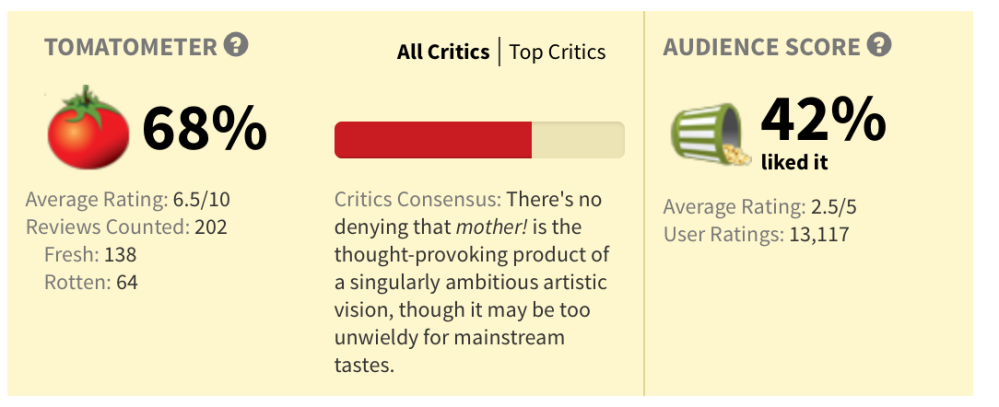Last weekend, Darren Aranofsky released his latest film Mother! to abysmal box office results and quite strong negative reactions by audiences. Critics, overall, seemed to have liked it, but the public in general was mostly confounded, if not downright outraged by what they had watched. CinemaScore, a site that surveys audiences reviews of films gave the film an F, one of the very few movies to ever receive that score. Critics in Rotten Tomatoes were a bit more generous, and the site gave the film an aggregate of 68%, but even critics who liked the movie acknowledged that it could also be perceived as a mess (see this analysis in Rotten Tomatoes about the various reactions to the film).


The film had all of the ingredients for success: a director with a proven track record who had helmed smart and challenging films in the past such as Pi, Requiem for a Dream, The Wrestler, Black Swan, and Noah (which may have been the intellectual seed for this movie and its Biblical themes); Aranofsky’s films have won numerous awards, and have been well received by critics and intelligent audiences alike; Mother! has one of the few worldwide bonafide movie stars as its main protagonist, Jennifer Lawrence, and she is accompanied by a very strong cast with actors such as Javier Bardem, Ed Harris, Michelle Pfeiffer, and even Kristen Wiig. So what happened?
Long story short, I would argue that the failure is not so much of the movie, but of the way the studio released it (Paramount). The studio sold a sophisticated, thought provoking, and yes, sometimes pretentious, Biblical allegory that explores the way humanity is destroying Mother Nature, as a horror/psychological thriller that dealt with the tensions of a married couple in an isolated house. The trailer focused on Jennifer Lawrence and on the tension that builds up in the marriage and around the house the live in. And the film’s posters were all over the place, with images that evoked another famous horror film, Roman Polanski’s Rosemary’s Baby, giving (the false) impression that this was going to be a movie about an unsuspected pregnant mother whose husband is part of a satanic cult.
So the problem, I would argue, was not so much the film, but the expectations created around the film. Audiences were sold a particular kind of movie (a psychological horror film), only to be confronted with a very different one (a Biblical allegory about humanity’s destruction of nature). A similar thing happened to Guillermo del Toro’s Crimson Peak, a Gothic love story that was sold as a straight up horror film to the disappointment of audiences, and the frustration of del Toro himself. In the case of Mother! the problem is compounded by the fact that the studio did not have the slow rollout required for the art film that it is, but it was released nationally in thousands of theaters in one weekend. There was no time for small, curious audiences who intentionally seeked this film to create a buzz about the intelligence of the movie, its main conceit, its allegorical nature, its great performances… nope, the movie was put in front of unsuspected moviegoers who, in their majority, where either horror or Jennifer Lawrence fans (and in some cases, as I witnessed first hand this last Saturday, a few teenargers ended up watching Mother! after finding out that It was sold out!). People were right to be disappointed and even outraged, but they were disappointed and outraged for the wrong reasons.

To me, it is a shame that the lesson studios may take from this failure is that it is not a smart business decision to make this type of movies. Darren Aranofsky’s films are not always easy, but they are always thought provoking. Not all films have to be part of the Marvel or DC Universes, they do not all have to be sequels. Aranofsky’s film is a powerful and emotional exploration of the horrors and abuses of humanity over Mother Earth, and he explores this idea through the use of Biblical images and metaphors: Javier Bardem as God creating Mother Nature for his amusement, the creation of Adam and Eve, the Fall, the killing of Abel by Cain, the birth of Jesus (Jennifer Lawrence character’s baby with Javier Bardem) and the writing of the New Testament (the poem created by Bardem’s character after a long period when he was unable to write), the death of Jesus (the sacrifice of the baby), and the spiral of violence and destruction that humanity has brought upon itself ever since. The film goes for broke, particularly in its final third, but it is also a cinematic tour de force, the expression of an artist who doesn’t care if he comes through as pretentious (which he sort of does). He is convinced of the power of his ideas and his ability to deliver those ideas in a compelling, provocative way (which he does!).

It is easy to make fun of artists such as Aranofsky (those pretentious auteurs), but I commend him for at least trying. I, myself, left the movie confounded, but I have not been able to stop thinking about the film since I saw it on Saturday. Mother! is a film like no other, and you should give it a shot. So go watch it. I cannot guarantee that you will like it, but I promise you that it will stay with you long after you see it.

